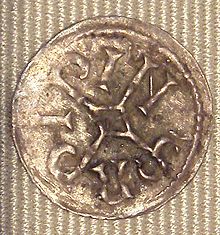Talk:Pepin II of Aquitaine
Appearance
| This article is rated Start-class on Wikipedia's content assessment scale. It is of interest to the following WikiProjects: | |||||||||||||||||||||||||||||||
| |||||||||||||||||||||||||||||||
Pepin II and paganism
[edit]Are there any sources for Pepin becoming a pagan? I can't find it anywhere else besides on this page. None of the other language Wikis seem to mention it, nor do any other sources.rcduggan (talk) 16:26, 26 November 2008 (UTC)
- I believe I may have gotten the information from Charles Oman, The Dark Ages (1914), but I can't remember. If you look here it says that "a hostile source" (apparently friendly to Charles the Bald) claims he abandoned Christianity to join the Vikings "and lived like one of them", but the author of that encyclopaedia article apparently believes this to be unlikely, derived from his alliance with the Vikings. Archibald R. Lewis, The Development of Southern French and Catalan Society (1965), mentions Pepin's Viking alliance without reference to paganism. Edward Peters, The Shadow King (1970), cites criticism of Pepin from the Annales Bertiniani, but it does not include paganism (under the year 843). Srnec (talk) 19:45, 26 November 2008 (UTC)
- The Annales Bertiniani does not actually mention Pepin under 843, but for 864 (the "hostile source" from google books above) says: "Charles arranged his troops and ordered the Aquitainians to advance against the Northmen who had burned the church of St-Hilary. He himself returned to Compiègne taking with him his son and namesake Charles, and he sent his missi to Gothia to receive the submission of the civitates and fortresses there. The Northmen got to Clermont where they slew Stephen, son of Hugh, and a few of his men, and then returned unpunished to their ships. Pippin, son of Pippin, who had changed back from being a monk to become a layman and an apostate, joined company with the Northmen and lived like one of them."
- Janet L. Nelson's edition of the Annales (1992) notes for the sentence I bolded: " ‘Apostate’ here has the technical sense of a monk who has abandoned his profession. Ritum eorum servat has been taken to mean ‘followed their religion’; Wallace-Hadrill 1975: 226 [‘The Vikings in Francia’, Reading]. But ritus can mean ‘habits’ or ‘way of life’: e.g. above 841: 51, n. 8; and RFA 823 [Royal Frankish Annals (Annales regni Francorum)]. See further Coupland 1992 [misprint; bibliography has works from 1988, 1990, 1991]; and below n. 19. Clerical anxieties generated a myth of proselytising Viking paganism; but in fact Viking religion was eclectic; Wood 1987: 49-58 [‘Christians and pagans in ninth-century Scandinavia’, in B. Sawyer, P. Sawyer and I. Wood eds., The Christianization of Scandinavia]." Idontcareanymore (talk) 01:26, 23 March 2011 (UTC)
Coinage
[edit]
Here's a coin of Pepin II d'Aquitaine. Feel free to insert it in the article. Cheers PHG (talk) 20:10, 20 January 2009 (UTC)
Categories:
- Start-Class biography articles
- Start-Class biography (royalty) articles
- Unknown-importance biography (royalty) articles
- Royalty work group articles
- WikiProject Biography articles
- Start-Class Middle Ages articles
- Low-importance Middle Ages articles
- Start-Class history articles
- All WikiProject Middle Ages pages
- Start-Class France articles
- Mid-importance France articles
- All WikiProject France pages



